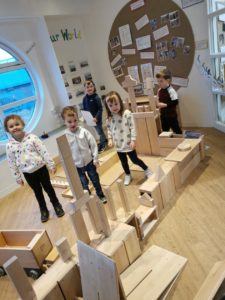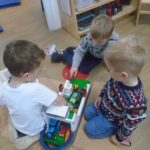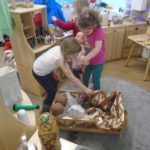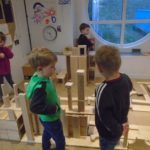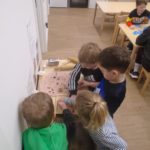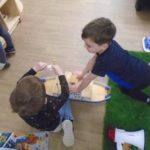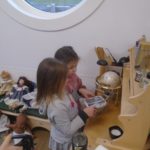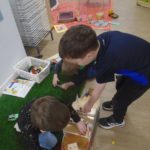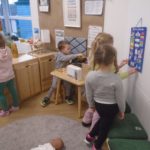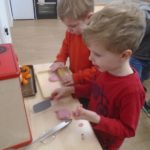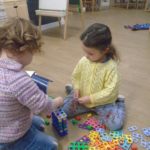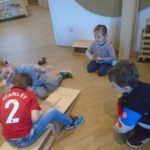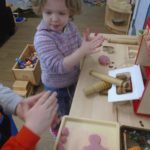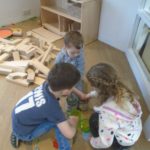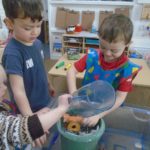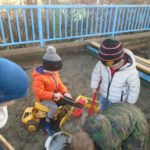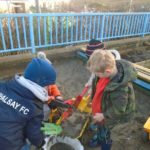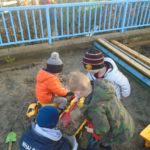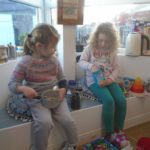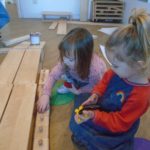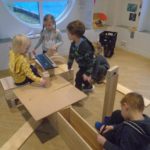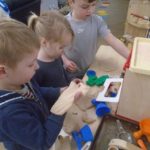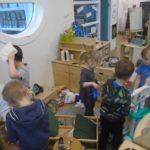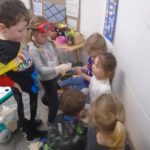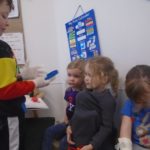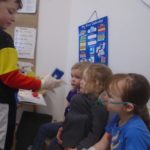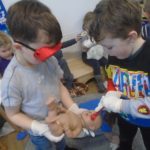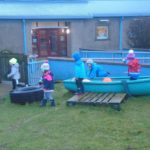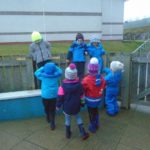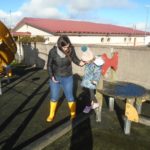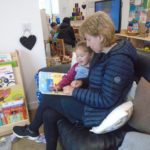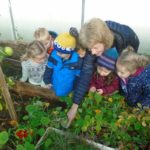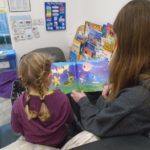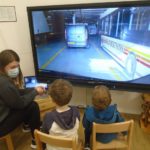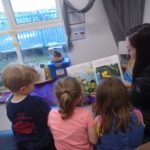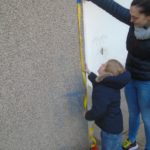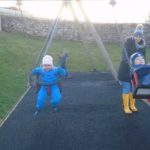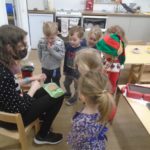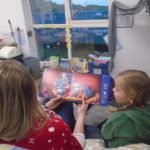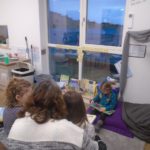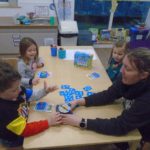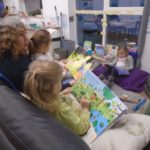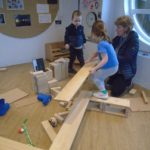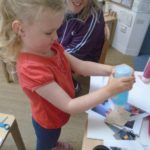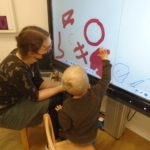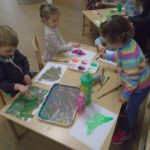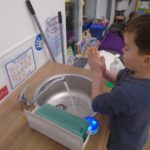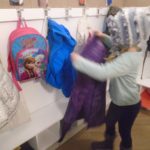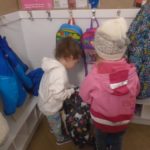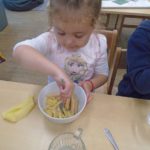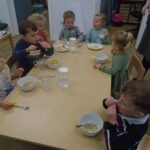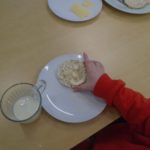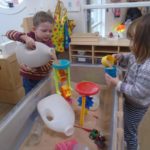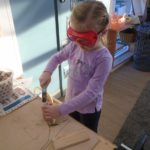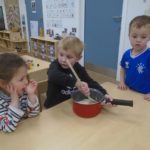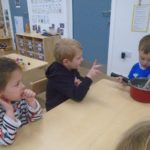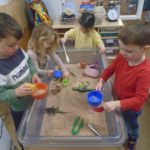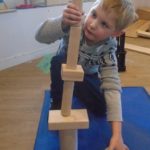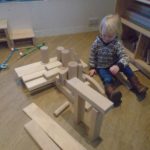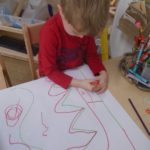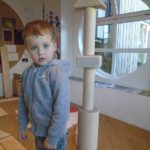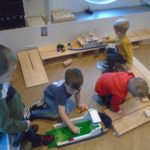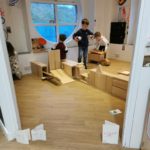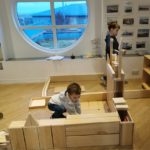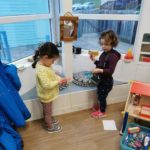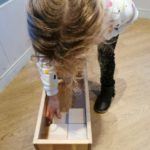It’s been a busy first full week at nursery which has included exploring some of our previous interests, such as ferries and boats, while also expanding into new areas of wonder such as Space!
On Monday there was a lot of shared enthusiasm about travelling to various places in Shetland on the “ferry”. Playing in this way helps us to explore and learn about aspects of familiar life as we act out roles such as “ferryman/woman”, “truck driver”, “car driver” and “skipper”. Negotiating play in larger groups develops our communication skills, social and emotional abilities.
The drivers listened to the ferry workers as they signalled them on board and directed them where to park. This type of play develops our literacy and numeracy skills as we use positional language such as forwards, backwards, stop, start, up, reverse and turn around.

Once the ferry arrived at the pier it was important to wait until the ramp was down and the barrier removed before disembarking. Talking about time in this way helps us to connect time to real life contexts and to link words such as minutes, seconds, hours to time.

We travelled to a lot of places around Shetland, showing our knowledge and sense of local places. We went on board a variety of ferries to get to these places too.

There was a lot of discussion about having a booking, forming queues, waiting and what time the ferry was leaving and arriving.

Indoors the transport theme continued with some boat building. Tommy and Sophie created a fishing boat. It was “going to catch herring. It has masts and it’s great big.” (Tommy) Harry and Lewis measured aspects of their boat to make sure the gap was “big enough for fish to get in.”


Outdoors Alfie, Elsie, Lewis and Lucas took the punt to Veivo. Lucas did a great job securing the boat to the pier. Pulling at big ropes like these helps develop core strength and shoulder, arm and hand strength which we need for writing activities.


By mid week the mode of travel and destination had changed when some of us decided to create a rocket and blast off to the moon! During our play we were asked some questions to extend our learning and promote our thinking.
How long is it going to take you to reach the moon? “96 days” (Ali), “1 day” (Annie).
What do you think you’ll find when you get there? “Water” (Ali), “Moonsteens” (Sonny), “Cheese!” giggled Alfie.
Once the rocket was ready we did a count down from 10 to blast off into space. Annie phoned ground control and put the codes in before we left. Using number in this way helps us to learn about numbers before and after as well as counting on and back.

We also had some questions of our own about the moon…
“Why is there big holes on the moon?” (Sophia)
“Is there volcanoes on the moon?” (Lewis)
“Why do you float on the moon?” (Elsie)
It is important for us that we have resources readily available to us that link to the questions we are trying to explore. We looked at some books, and the Smartboard, to find out some answers and will continue to find out more answers to our questions next week through our play.
We found out there is less gravity on the moon so we are not pulled down as much. Some of us tried walking lightly and slowly when we landed on the moon.


Sophia learned that asteroids and meteorites hit the moon and made the holes that she’d noticed.



Once we landed on the moon there was a problem. “The engine is very broken, we need to go back to earth and bide there for 60 days and fix it.” (Ali) Being back on earth for sixty days allowed us to fix the rocket and to add more specialised equipment to it. There was a lot of discussion and sharing ideas during this time which are important literacy skills.


“We need a button and dan we need to stick dis bit in the square as weel.” (Annie) “I’m fixing this hole so we can fly.” (Ali)

“Dis is the fire” (Annie) “Dis is part of the engine” (Tommy)

Eventually the rocket was ready for another adventure…you’ll find out more next week!

Boats and rockets have not been the only constructions this week. Sophia made a magical castle and Annie and Harry made a bicycle garage. Both of these constructions taught us a lot about gravity as some parts fell over and we had to figure out how best to balance them!




It’s not all been fast paced space travel or building projects, there’s also been plenty of time to relax. Having a variety of spaces in our environment, which offer different experiences, helps our growth and development. We choose to relax in many ways at nursery, some examples include listening to stories, songs and rhymes, playing in the water and sand and playing with playdough. All of these activities can bring a sense of calm and quiet focus and engagement to parts of our day.
Listening to stories, songs and rhymes and exploring books with nurturing and responsive adults helps open up communication and connect literacy to our lives. Sharing books and stories together with our friends encourages us to see ourselves as readers and writers and helps develop our interest in learning about words, letters and pictures as we discuss what we see, ask each other questions and share our stories.



This week the sand wheels have been a great source of wonder and experimentation as well as a place where we have developed numeracy and literacy skills.
Annie and Ali explored how to make the wheels spin faster. They filled big containers full of sand and tried to tip them over the top really fast. The whole thing disappeared so we didn’t know if the wheel went faster but the “sand waterfall” was exciting to watch and to repeat! We counted scoops out loud to help us think about number and volume, and estimated how many scoops we thought might be needed to fill each container.


Following this Annie wanted to see what would happen if we blocked the hole. She snipped some paper into the top of the funnel. “It’ll get stuck” thought Jim, “It’ll no work anymore” said Ali. Predicting and hypothesising is an important scientific skill.

Were they right? Yes they were. Although some small grains of sand slid through there was not enough to make the wheel turn. An interesting discovery!

Lucas explored gravity and balance whilst playing in the sand. He balanced the whole sand toy on top of a cup and carefully poured sand to see if the cup would fill. “It’s gone in!” He exclaimed.

The large containers really helped us work on our literacy skills such as pre-handwriting skills, listening and talking. Lucas and Alfie took turns and worked together to fill the big container. “I want it to go dis high up ok Lucas.” (Alfie) “I pour more in for you.” (Lucas) “Yeah pour lots and dan it will go higher and higher and higher!” (Alfie).

Ali’s whole body worked hard to lift the heavy container and to keep it steady enough to pour gently. Using our muscles in this way and focussing on a task prepares us for formal writing activities when we get to school.

Having spaces where we can develop our gross and fine motor movements through play helps us become physically healthy individuals, develops our numeracy skills and also encourages us to practice moving our bodies in ways that will help us with handwriting later on.
Squeezing water out of sponges is a great way to develop hand, wrist and finger strength and control for writing. Sharing play as we wash babies encourages us to use mathematical and scientific language such as “wet, dry, squeeze, light, heavy” and helps us become gentle and caring as we role play looking after the babies.



At nursery, both indoors and out, there is a wide range of interesting resources to use for mark making. These encourage us to communicate our ideas through mark making, painting and drawing. This week paint sticks and chalk have been our most popular choices.






Trying to follow zigzag lines using bikes, scooters and our bodies was difficult but fun and a great way to work on our balance and awareness of our bodies in space!







We extended this playfulness into concrete resources too. Sophia, Thea and Alfie made “lines wi wid to follow” (Thea). We needed good balance skills to stay on the lines, especially the round tyre “oooh the tyre is wiggly” (Alfie)



There was also lots of mark making in the “office” and the “shop” this week in the form of Free Parking tickets, receipts and lists.




And finally a big warm welcome to Archie who started nursery this week. Welcome Archie!



